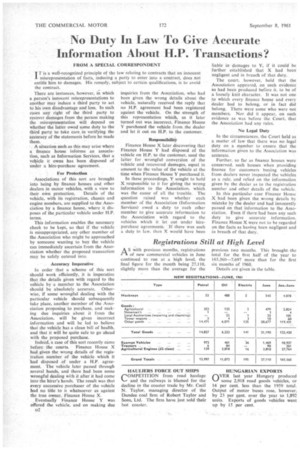• No Duty In Law To Give Accurate Information About H.P. Transactions?
Page 66

If you've noticed an error in this article please click here to report it so we can fix it.
FROM A SPECIAL CORRESPONDENT
IT is a well-recognized principle of the law relating to contracts that an innocent misrepresentation of facts, inducing a party to enter into a contract, does not entitle him to damages. His remedy, subject to certain qualifications, is to avoid the contract.
There are instances, however, in which a person's innocent misrepresentations to another may induce a third party to act to his own disadvantage and loss. In such cases any right of the third party to recover damages from the person making the misrepresentation will depend on whether the latter owed some duty to the third party to take care in verifying the accuracy of the statements before he made them.
A situation such as this may arise where a finance house informs an association, such as Information Services, that a vehicle it owns has been disposed of under a hire-purchase agreement.
For Protection Associations of this sort are -brought into being by finance houses and other dealers in motor vehicles, with a view to their own protection. Details of the vehicle, with its registration, chassis and engine numbers, are supplied to the Association by a finance house, where it disposes of the particular vehicle under H.P. terms.
This information enables the necessary check to be kept, so that if the vehicle is misappropriated. any other member of the Association who might be approached by someone wanting to buy the vehicle can immediately ascertain from the Association whether the proposed transaction may be safely entered into.
Accuracy Imperative In order that a scheme of this sort should work efficiently, it is imperative that the details given with regard to the vehicle by a member to the Association should be absolutely accurate. Otherwise, if some wrongful dealing with the particular vehicle should subsequently take place, another member of the Association proposing to purchase, and making due inquiries about it from the Association, will be given incorrect information and will be led to believe that the vehicle has a clean bill of health, and that it will be quite safe to go ahead with the proposed purchase.
Indeed, a case of this sort recently came before the courts. Finance House X had given the wrong details of the registration number of the vehicle which it had disposed of under a H.P. agreement. The vehicle later passed through several hands, and there had been some wrongful dealing with it after it had come into the hirer's hands. The result was that every successive purchaser of the vehicle had no title to it whatsoever as against the true owner. Finance House X.
Eventually Finance House Y was offered the vehicle, and on making due 02 inquiries from the Association, who had been given the wrong details about the vehicle, naturally received the reply that no agreement had been registered against the vehicle. On the strength of this representation which, as it later turned out was incorrect, Finance House Y purchased the vehicle from .the dealer and let it out on H.P. to the customer.
Responsibility Finance House X later discovering that Finance House Y had disposed of the vehicle on H.P. to the customer, sued the latter for wrongfulconversion of the vehicle and recovered damages, equal in amount to the value of the vehicle at ffie time when Finance House Y purchased it.
In these proceedings, Y sought to hold X responsible to it for giving the wrong information to the Association, which was the cause of all the trouble. The question raised was whether each member of the Association (Information Services) owed a duty to each other member to give accurate information to the Association with regard to the vehicles which it let out under hirepurchase agreements. If there was such a duty in law. then X would have been
liable in damages to Y, if it could be further established that X had been negligent and in breach of that duty.
The court, however, held that the Association appeared, on such evidence as had been produced berore it. to be of a loosely knit character. It was not one to which every finance house and every dealer had to belong, or in fact did belong. There were some who were not members. Nor did it appear, on such evidence as was before the Court. that the Association had any rules.
No Legal Duty In the circumstances. the Court held as a matter of law that there was no legal duty on a member to ensure that the information given to the Association was accurate.
Further, so far as finance houses were concerned, such houses when providing finance for customers buying vehicles from dealers never inspected the vehicles as a rule, and relied on the information given by the dealer as to the registration number and other details of the vehicle, In this particular case Finance House X had been given the wrong details by mistake by the dealer and had innocently passed on that information to the Association. Even if there had been any such duty to give accurate information. Finance House X were not to be regarded on the facts as having been negligent and in breach of that duty.


































































































































































